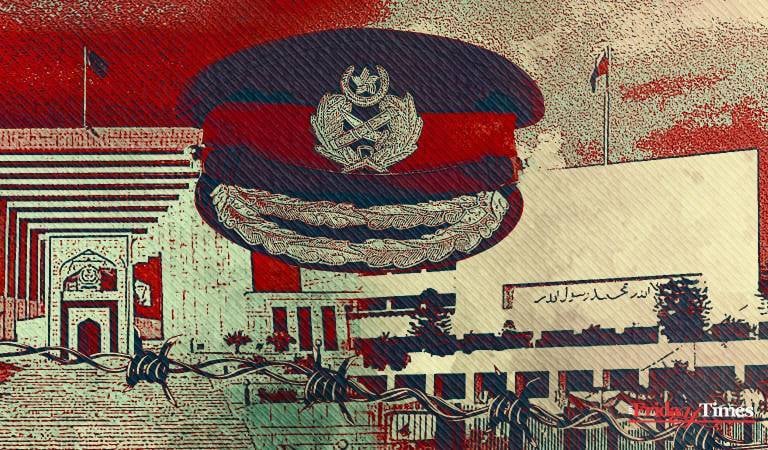From Judgement To Justification: How Parliament Undermined Military Accountability
By: Muhammad Mustafa Arif
Source: The Friday Times


The Supreme Court, in November 2019, gave a landmark judgement in the Jurists Foundation Case. By temporarily suspending a notification extending the term of the Chief of Army Staff, underscoring the absence of any legal structure governing such extension, the court effectively shook the foundations of how military leadership transitions are handled in the country. The judgement essentially gave the Parliament six months to legislate on this matter, providing a substantial opportunity to bring clarity, uniformity, and fairness to a process long manipulated behind closed doors.
Within a span of five years, the country appeared to regress to an even more precarious institutional state. In a series of legislative manoeuvres, the Senate, in November 2024, passed a bill amending the Pakistan Army Act of 1952, the Pakistan Navy Ordinance of 1961, and the Pakistan Air Force Act of 1953. These amendments effectively abolished the upper age limit for a four-star general, thereby allowing incumbents to remain in office beyond the age of 64. Moreover, the amendments repealed Section 8C of the Army Act, which had previously stipulated that appointments, reappointments, or extensions of service were subject to the age cap. Significantly, the insertion of the phrase “and/or” between “reappointment” and “extension” has further blurred the distinction between the two terms, creating a legal pathway for prolonged/indefinite tenures in military leadership.
For the average citizen, the implications of these changes remain clouded by the myth of indispensability: "there is no one else fit for command." But in a country whose Constitution declares that no one is above the law, such selective privilege cannot be accepted as ordinary governance.
Article 25 of the Constitution of Pakistan embodies the doctrine of equality before the law by providing equal treatment to all citizens. But the amendment to the military service acts seems to override this constitutional guarantee. By establishing two different classes among the officers, those who are entitled to an extension of their term and those who are not, these amendments establish a rank system in the armed forces in favour of a privileged few.
This differential choice immediately calls into question the integrity of democratic government. In theory, a democratic government is supposed to ensure that discrimination under the law is based on publicly stated, objective, and rational criteria. That no such publicly stated criterion for extending time limits for service chiefs is evident shows that decisions here are more based on political necessity than on institutional imperative or meritocratic considerations. This compromises the integrity of civil-military relations and the general principle of rule-of-law government.
All institutions rely fundamentally on a merit-based and predictable pipeline of leadership. If tenure at the top is extended far beyond its normal duration, the effects are not unique to one person. Rather, the ripple effect delays the promotion of an entire class of senior officers. Promotions are irrevocably stalled, succession planning is disrupted, and institutional morale is damaged inevitably. Thus, conveying an implicit but powerful message up the ranks: You can serve faithfully for decades, but unless political winds are at your back at the end, your prospects are slim. This dynamic quietly shifts the military's internal culture to one more controlled by personal loyalty and political calculation.
Institutionalising it risks cementing a culture whereby deference to power supplants proven ability. In the long term, it can undermine not only the internal discipline and esprit de corps of the military, but also its perceived legitimacy with the wider population. A democratic polity is best served by avoiding practices rewarding closeness to power over institutional objectivity. Otherwise, the military is at risk of being politicised at the top, with long-term implications for civil-military balance and democratic stability.
Also, the 2020 amendments, in Section 8B (2), explicitly ousted judicial oversight of the extension process. This strikes at the heart of constitutionalism by insulating executive action from legal scrutiny. Judicial review is not a discretionary feature; it is a structural safeguard that ensures executive power remains within lawful bounds. If such decisions are genuinely made in the national interest, subjecting them to judicial scrutiny should strengthen, not threaten, their legitimacy. Shielding such actions from review suggests an intent to avoid accountability.
Rule of law demands that no office, however powerful, stands above constitutional limits. Where legal oversight is removed, so too is the possibility of reasoned justification. This not only undermines the independence of the judiciary but weakens the very fabric of democratic governance.
One of the most persistent justifications for extending a service chief’s tenure is the claim of indispensability, that no suitable replacement exists. It implies a failure of institutional continuity and undermines decades of structured training, hierarchical progression, and talent development. If, after years of investment, an institution cannot produce a capable successor, the flaw lies not in the pool of officers but in the system itself.
The Parliament’s response falls short of the Court’s expectations. The removal of the upper age limits for service chiefs entrenched the culture of exceptionality, signalling a preference for experience over institutional equality. Rather than establishing a uniform, transparent policy for all senior officers, it enacted a narrow statute tailored to shield a select few. This bespoke legal architecture reinforced privilege over principle.
Pakistan's constitutional development has always been foiled by a tendency to put personalities over institutional integrity. The cost of this policy isn't a theoretical one, it's paid in the form of lost public confidence, bureaucratic ineptness, and democratic backsliding. Tenure extensions, if they are awarded at all, should be the exception and should be preceded by objective, transparent, and clear criteria. They should be driven by institutional need—rather than political expediency or personal fondness. Ultimately, democracy can only thrive if its institutions are valued more than the mortals who temporarily inhabit them.
Arif n Arif
Advocates and Solicitors
Contact
Support
info@arifnarif.com
042 37352016
© 2024. All rights reserved.
